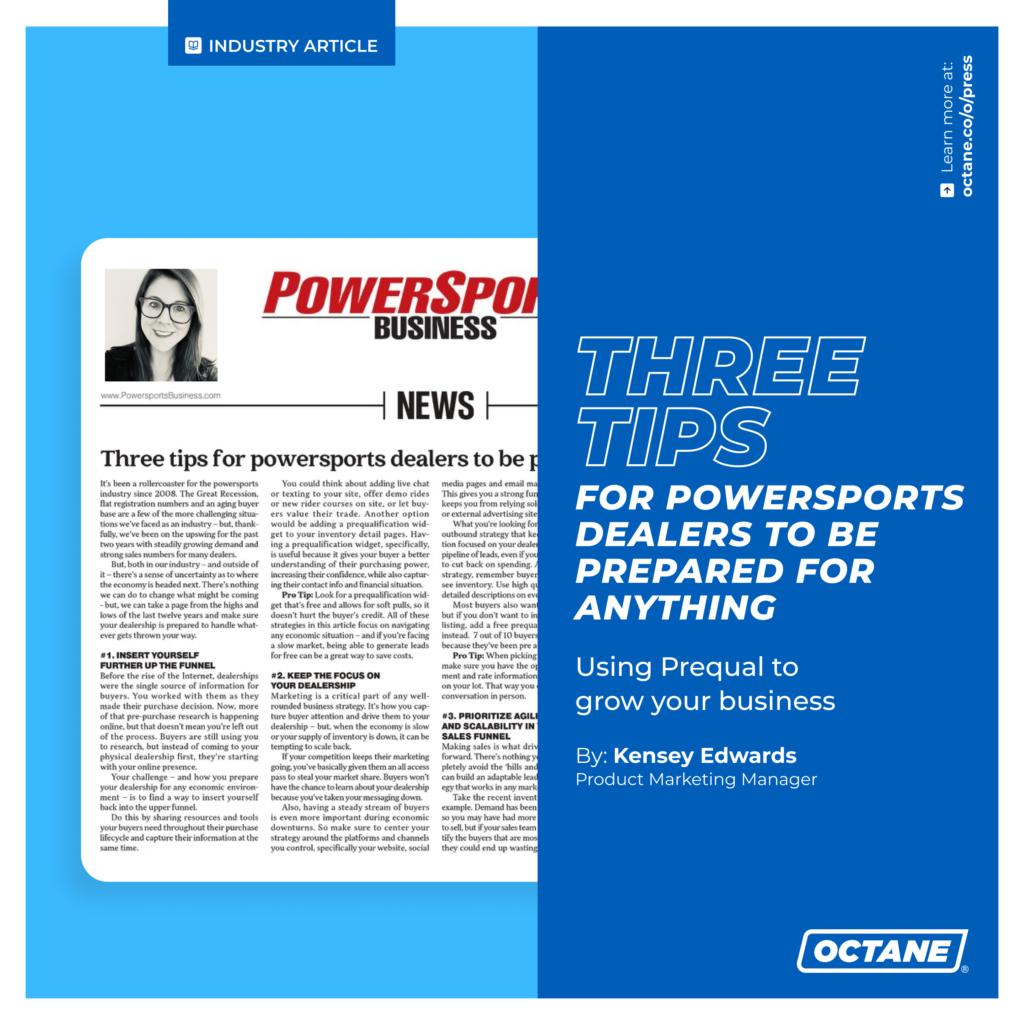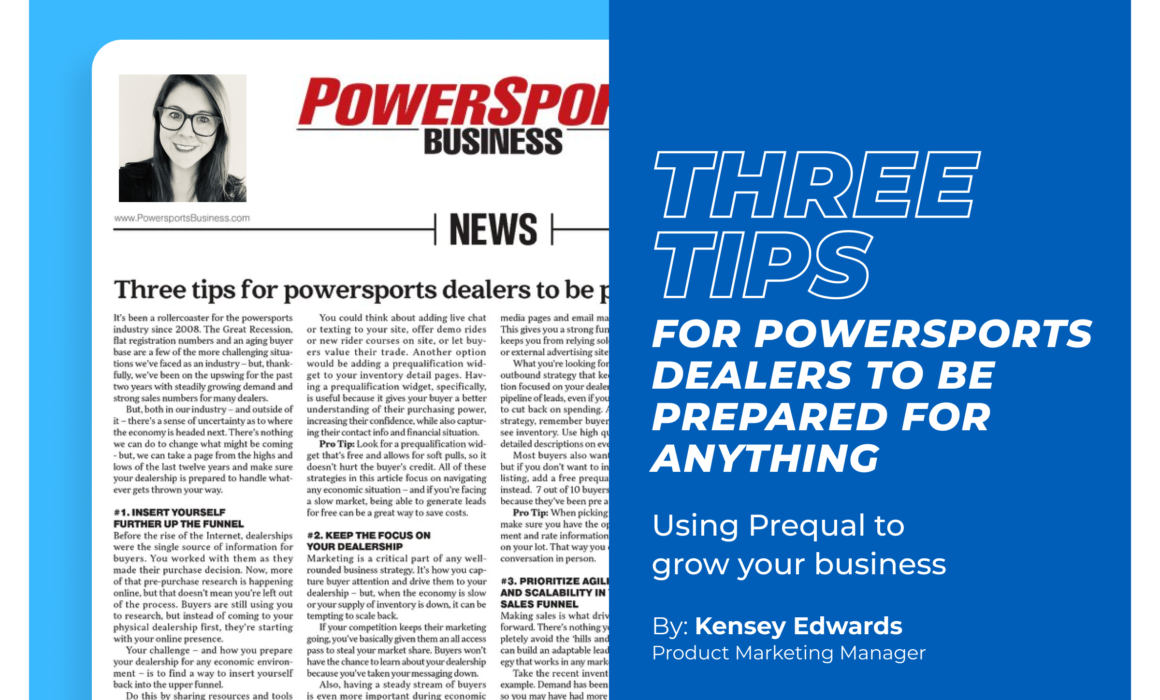
This article first appeared in the December 2022 issue of Powersports Business.
It’s been a rollercoaster for the powersports industry since 2008. The Great Recession, flat registration numbers and an aging buyer base are a few of the more challenging situations we’ve faced as an industry – but, thankfully, we’ve been on the upswing for the past two years with steadily growing demand and strong sales numbers for many dealers.
But, both in our industry – and outside of it – there’s a sense of uncertainty as to where the economy is headed next. There’s nothing we can do to change what might be coming – but, we can take a page from the highs and lows of the last twelve years and make sure your dealership is prepared to handle whatever gets thrown your way.
#1. INSERT YOURSELF FURTHER UP THE FUNNEL
Before the rise of the Internet, dealerships were the single source of information for buyers. You worked with them as they made their purchase decision. Now, more of that pre-purchase research is happening online, but that doesn’t mean you’re left out of the process. Buyers are still using you to research, but instead of coming to your physical dealership first, they’re starting with your online presence.
Your challenge – and how you prepare your dealership for any economic environment – is to find a way to insert yourself back into the upper funnel.
Do this by sharing resources and tools your buyers need throughout their purchase lifecycle and capture their information at the same time.
You could think about adding live chat or texting to your site, offer demo rides or new rider courses on site, or let buyers value their trade. Another option would be adding a prequalification widget to your inventory detail pages. Having a prequalification widget, specifically, is useful because it gives your buyer a better understanding of their purchasing power, increasing their confidence, while also capturing their contact info and financial situation.
Pro Tip: Look for a prequalification widget that’s free and allows for soft pulls, so it doesn’t hurt the buyer’s credit. All of these strategies in this article focus on navigating any economic situation – and if you’re facing a slow market, being able to generate leads for free can be a great way to save costs.
#2. KEEP THE FOCUS ON YOUR DEALERSHIP
Marketing is a critical part of any well rounded business strategy. It’s how you capture buyer attention and drive them to your dealership – but, when the economy is slow or your supply of inventory is down, it can be tempting to scale back.
If your competition keeps their marketing going, you’ve basically given them an all access pass to steal your market share. Buyers won’t have the chance to learn about your dealership because you’ve taken your messaging down.
Also, having a steady stream of buyers is even more important during economic downturns. So make sure to center your strategy around the platforms and channels you control, specifically your website, social media pages and email marketing channels. This gives you a strong funnel of buyers and keeps you from relying solely on paid media or external advertising sites.
What you’re looking for is a well-rounded outbound strategy that keeps the conversation focused on your dealership and a strong pipeline of leads, even if you temporarily have to cut back on spending. As you build your strategy, remember buyers always want to see inventory. Use high quality photos and detailed descriptions on every listing.
Most buyers also want to see a price – but if you don’t want to include that on the listing, add a free prequalification widget instead. 7 out of 10 buyers purchase sooner because they’ve been pre approved.
Pro Tip: When picking a prequal widget, make sure you have the option to hide payment and rate information until the buyer is on your lot. That way you can still have that conversation in person.
#3. PRIORITIZE AGILITY AND SCALABILITY IN YOUR SALES FUNNEL
Making sales is what drives your business forward. There’s nothing you can do to completely avoid the ‘hills and valleys’, but you can build an adaptable lead generation strategy that works in any market.
Take the recent inventory shortage, for example. Demand has been outpacing supply, so you may have had more buyers than units to sell, but if your sales team can’t quickly identify the buyers that are most likely to convert, they could end up wasting time just sorting through your inbound leads. On the flip side – when inventory eventually rebounds and supply potentially outpaces demand, your strategy needs to be more focused on lead generation to capture buyers in your market, and beyond, so your team has plenty of prospects to work.
What you’re looking for is a way to maintain a wide reach and a strong pipeline of leads, while also having enough buyer information to segment eliminate unqualified or unmotivated buyers quickly. To make this work, you need more meaningful context on each buyer.
Giving buyers the option to prequalify from your website, for instance, increases out of state applications by 184%, while also decreases the number of applications without a location by 40%. The reason a tool like this works in any market environment is because, in high demand, low inventory environments: You have the information you need upfront to quickly deprioritize buyers who aren’t actively looking to buy or aren’t able to make the purchase.
In normal supply, decreased demand environments: You have a wide-reaching pipeline to keep your lead volume up, steadily funneling buyers to your team.
Pro Tip: Try to find tools that work with your current DMS. That way, you can keep all your lead information in one place for fast and easy sorting.
As the Product Marketing Manager for Octane, Kensey Edwards works closely with Octane’s product team to launch industry-leading solutions that help powersports dealers. Contact her at kensey.edwards@octane.co.


